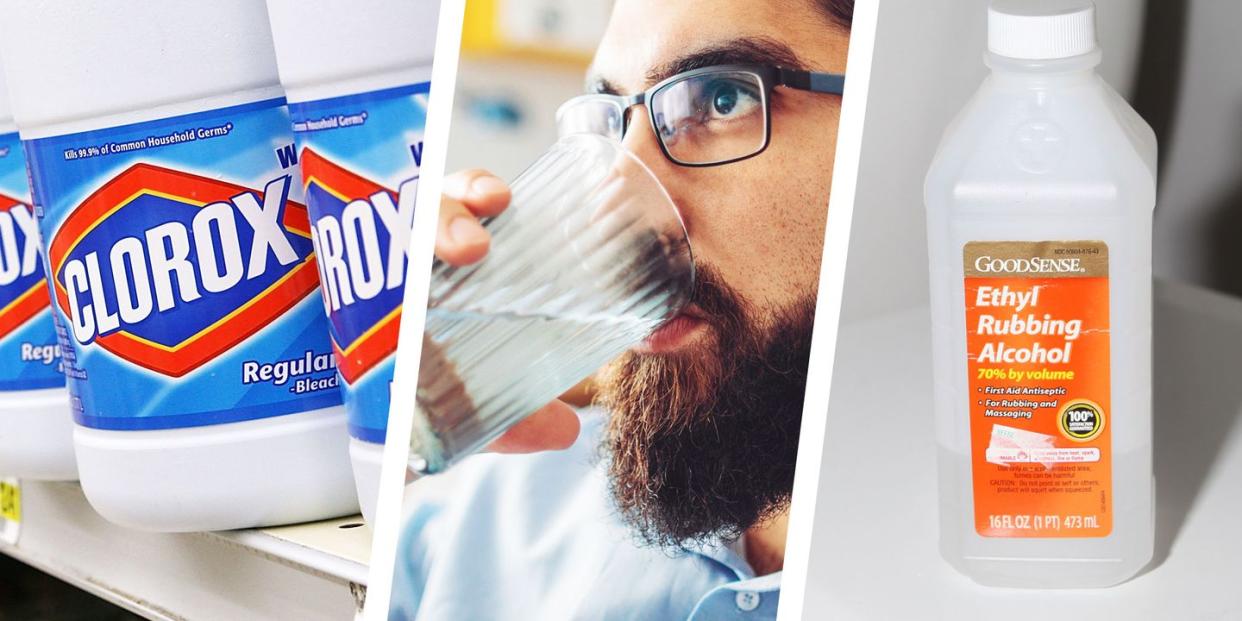Why It's a Really, Really Bad Idea to Consume Disinfectants

In a briefing yesterday, Bill Bryan, an undersecretary at the Homeland Security Department, discussed some research on what’s believed to kill the novel coronavirus effectively. In a comment about what might be useful to use in “potentially contaminated indoor spaces,” Bryan explained what had been tested—bleach, isopropyl alcohol, and “we’re also looking at other disinfectants.” In the kind of sentence that raises hope in so many people, he continued, “I can tell you that bleach will kill the virus in five minutes. Isopropyl alcohol will kill the virus in 30 seconds.”
And among the statements was the potentially confusing one of “we’ve tested isopropyl alcohol on the virus specifically in saliva and respiratory fluids.” That doesn’t mean isopropyl alcohol was put into people’s tongues, lungs, or bodies, although some internet wildfires suggested that people interpreted it that way. Let’s be clear: that’s a dangerous thing to do.
When President Donald Trump spoke immediately after Bryan’s statements, he said, "I see the disinfectant that knocks it out in a minute, one minute. And is there a way we can do something like that by injection inside or almost a cleaning? As you see, it gets in the lungs, it does a tremendous number on the lungs, so it would be interesting to check that."
Effects of drinking bleach and other disinfectants
While Trump didn’t say drink or inhale disinfectants, it could be interpreted that way, which would be an incredibly dangerous thing to do (see two case reports from a clinical adjunct professor at the University of Illinois to see what kind of damage it can do).
Immediately, manufacturers like the maker of Lysol issued statements that “under no circumstances should our disinfectant products be administered into the human body (through injection, ingestion, or any other route).”
"Do not do that," warns Benjamin Chapman, Ph.D., food safety expert at North Carolina State University. He previously told Men's Health that ingesting Lysol only increases your risk of becoming seriously ill, which is what you want to avoid in the first place.
Similarly, drinking bleach can have life-threatening side effects, and it can cause vomiting, severe diarrhea, low blood pressure and acute liver failure. It won’t do a thing against the novel coronavirus, as we explained earlier this year. Don’t inhale it, either.
“Inhaling chlorine bleach would be absolutely the worst thing for the lungs,” John Balmes, a pulmonologist at Zuckerberg San Francisco General Hospital, and a professor of medicine at the University of California San Francisco, explained to Time. “The airway and lungs are not made to be exposed to even an aerosol of disinfectant.”
Drinking isopropyl alcohol is extremely dangerous as well, causing burns, vomiting, slowed breathing and unconsciousness, to name just a few of the problems it creates.
That said, it’s smart to use disinfectants as directed, to clean surfaces those respiratory droplets and viruses may have landed on.
Medical experts agree that no one should try these measures of inhaling or ingesting them as prevention or treatment.
"Do not try these things at home, and follow your doctor's advice and follow good public health guidance," Leana Wen, MD, former Baltimore health commissioner, told CNN. And read the labels of your disinfectants for proper use.
You Might Also Like

